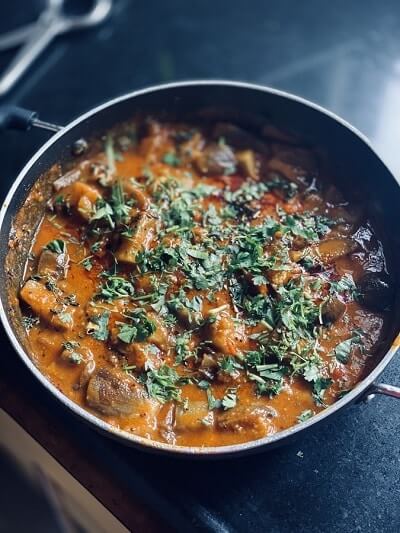When 29-year-old Vaibhav Pokhriyal moved into his new apartment in Dee Why, he never would’ve guessed what a stir (no pun intended) his cooking would create.
Merely two weeks in, a sign went up on the building’s community noticeboard, in bold letters: ‘Stop cooking curry! This building smells like an Indian restaurant.’
Was it the garlic paste in his dal? The hing in his aloo sabzi? Whatever the case, it rubbed his new neighbours the wrong way – and they were determined to let him know.
To receive such a passive-aggressive note about their cooking might deter some people. Vaibhav, though, was determined to continue his habits as is.
“I’m still cooking Indian food,” he told Indian Link. “I’m not going to stop because of this complaint. I’m certainly not going to make pasta every day.”
In fact, he took it a step further. He decided to address the passive-aggressive note with a little one of his own: ‘If you are tired of your food, you’re welcome to try some of mine.’
Both notes stayed up on the noticeboard for at least a month before they were taken down.
Unfortunately, this isn’t a lone incident of Indian cooking receiving backlash from neighbours or landlords. Indian community groups on Facebook have seen numerous posts about neighbours who complain about the strong smell emanating from their kitchens.
“I am in so much stress that I have stopped cooking Indian food,” one user lamented.
Another user shared that they moved out of their new apartment after a few weeks because of unpleasant incidents with their neighbours.
“My cousin was looking at properties around Western Sydney. When he found one that he liked, he was told by the agent that the landlord doesn’t lease to Indian or Chinese families because of the smell of the cooking,” Vaibhav added.

In situations like this, it’s hard to shake off the paranoia upon realising your food makes you stand out negatively from the rest of the crowd.
24-year-old Aishwarya Reddy, a consultant in Sydney, recalls a cross-cultural management class from her time at the University of Sydney where the students were encouraged to have an open, honest conversation about stereotypes.
“We were a pretty mixed class with Indian, Chinese, and Caucasian students. When we were asked about Asian stereotypes, we talked about seafood, soy, strong vinegar smells,” she explained to Indian Link.
“When it came to Indian food and the ‘smell’ of garlic, I was surprised and initially offended. Then I realised this is how the other communities must’ve felt during the discussion.”
READ ALSO: The politics of curry
Since then, Aishwarya became a little more conscious of her cooking at home, where she had American, Latino, and Korean flatmates. To be more mindful of those around her, she started to put a cloche over the pan while cooking and began to ventilate the house as much as possible.
For many first-generation kids, there’s also the daunting ‘lunchbox moment’ when they feel targeted for the smells coming from their packed lunches. To avoid ridicule, they eventually switch to ‘safer’ lunches at school.
Of course, the argument goes beyond homes. A common question on Airbnb’s host discussions rooms has been: ‘can you ask guests to not cook curry or smelly foods?’ Some queries are more strongly worded than others, but the common sentiment is that curry has a strong, lingering smell which all Airbnb guests might not enjoy.
Cultural perspectives on food
It all boils down to understanding and recognising differences.
As individuals, we tend to be cautious of smells, sights, and sounds that we aren’t accustomed to. However, when migrant communities have faced these kinds of issues all over the world, the idea of “smelly food” isn’t limited to any one cultural group.
Plenty of “white” foods like Roquefort blue cheese and anchovies are associated with strong smells.
Early European families arriving in Australia felt the brunt of similar ostracism with their salamis, cheeses, and sauerkraut.
South-east Asian foods like kimchi, and fruit such as durian, are strong in their smells but are delicious to eat.
And yet with increased interaction and exposure came acceptance, even true relish. Even a ubiquitous supermarket item such as yogurt was hard to find commercially until not so long ago – today the average Aussie consumes around 7.5 kilograms of yogurt annually.

The international food aisles in supermarkets, while convenient, are another way that we see a form of food politics play out. Some items, like olive oil with Mediterranean origins, sit comfortably on shelves while lentils, tortillas, and curry paste find themselves in different aisles. With time, as these ingredients become more common and normalised in households, maybe we won’t need to see such a demarcated space.
READ ALSO: How chef Nabil Ansari popularised Indian cuisine during the lockdown
So what’s the problem?
Unfortunately, unpleasant incidents crop up when others feel the need to impose their ideas. Who likes to be told what they can cook in the comfort of their own home?
Perhaps all this boils down to the way we accept, and give out, criticism. Think back to neighbours of other cultural backgrounds whose cooking might have affected you negatively in any way. Or even consider other Indian families whose cooking might smell different than our own.
Without doling out shame or disapproval, maybe it’s time we accept that food has a smell. Sometimes we like it, sometimes we don’t.
(But if you’re facing particularly nasty incidents with your neighbours or landlords, do something about it. Reach out to strata or your local council. Disagreements are okay, racist remarks are not.)

What WE can do about our cooking smells
- A new-age trick to get rid of strong smells is lighting a candle to soak up the air in a room. Try it out next time you’re cooking – and no, it doesn’t have to be a scented candle.
- Cooking food, especially Indian food, can be a long process. Try to clean as you go, including wiping down the stove top and the adjoining wall when you’re done, to limit the lasting scent.
- If you’re expecting guests, it might help to finish your cooking of curries and other strong-smelling food the day before.
What YOU can do about our cooking smells
- Simply tell us if you find our food overpowering. We don’t find it so, so we won’t be aware until you tell us. Most of us would take an extra step, like using a cloche, to make it a more comfortable experience. (Try not to sound like Vaibhav Pokhriyal’s neighbour though).
- Know that some of your own foods smell too – there are some pretty strong-smelling cheese; and an egg sandwich for lunch can stink up the office, or even microwaved cheddar popcorn. So it’s not just curry, or ‘ethnic’ or ‘Asian’ foods. Strong taste = strong smell.
- Give our food a try. If you like the taste, you might find you’ll be able to tolerate the smell. Most of us could not stand the look and smell of Vegemite when we first came here, but we gave it a go as the anthem of Australia says we should. Try and broaden your palettes when you go out to eat.
PS: Numerous readers reached out to say that they had actually gotten compliments about their cooking from friends, neighbours and acquaintances. Some even asked for recipes to try at home. Always a great sign!
With inputs from Rajni Anand Luthra.





